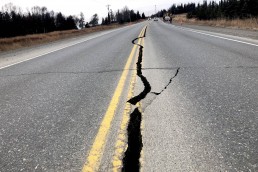All About Earthquake Insurance
All About Earthquake Insurance
Did you know that every year there are roughly 4,000 recorded earthquakes in Canada? Many of us wouldn’t have thought that a country like Canada would be so prone to these natural disasters but experts in British Columbia (BC) warn that in the next 50 years, there is a 30% chance of a significant earthquake in the province. As a result of these global disasters, the Insurance Bureau of Canada (IBC) commissioned an Earthquake study. One of the results of the study estimated that the overall cost, following a 9.0-magnitude earthquake in BC was nearly $75 billion. The full report also quantified the number of damage Canadians could expect if faced with a significant earthquake. It demonstrated that a major earthquake would have a significant economic impact regionally as well as a domino effect on the entire Canadian economy. As a homeowner, do you know if you are protected if an earthquake strikes?

In General
Now knowing these statistics, this may be the perfect time to review your insurance policy to see if it includes earthquake insurance. It is interesting to note that earthquake coverage typically does not form part of most standard home insurance policies. It can however be purchased separately, assuming your property is eligible for the coverage. It will carry with it an additional premium amount and is always subject to a higher (separate) deductible than coverage for other perils included in your policy.
In recent years, we’ve seen the cost of earthquake insurance rise globally and here in BC. This is partly due to the rise in natural disasters, the impact from climate change and the general spike in the cost of living.
Rising costs are something we all need to consider but getting the proper coverage if an earthquake strikes, should be an important decision as a homeowner. It is important to do your research to understand if your property is at risk, based on the location of your property and the infrastructure it is built on.
As we have seen in similar disasters in other parts of the world, earthquakes can leave entire cities paralyzed and many homes destroyed. In the next few sections, we will take a closer look at earthquake coverage, how much it roughly costs to purchase, and whether it is worth purchasing for your home or condo.
What is Earthquake Insurance?
In its simplest description, Earthquake insurance covers the loss or damage caused to a property as well as its contents, because of the shaking of the earth. In most policies, if the shaking of the earth results in a fire, only the resulting loss or damage from the fire would be covered under an ordinary home insurance policy. However, if your home is damaged because of the earth-shaking, not a fire, your standard home insurance policy would not cover the resulting damage unless you have purchased the earthquake coverage add-on.
It is true that earthquakes do not occur as frequently as other natural disasters. While that may be true, earthquakes can cause disastrous damage to homes, possessions, and other buildings. They can happen at any time and can leave people completely stranded, without any of their possessions or even a place to live. Having earthquake insurance provides you with peace of mind knowing that should a major quake hit the Lower Mainland, your home and your belongings are covered.
Cost of Earthquake Insurance
Over the years, the cost of earthquake coverage has increased substantially. Depending on the area of BC that you live in, the additional premium directly attributable to the earthquake can make up as much as 25-35% of your overall premium. Multiply that amount by the number of years you own your home or condo for, and you are paying a significant amount of money for something that may never happen in your lifetime. If the earthquake coverage component costs $300 a year to have and one lives in their home or condo for 40 years, that’s $12,000.
Purchasing any type of insurance requires all of us to look at the costs and benefits. While this cost may seem like a lot – especially at the moment with costs of living rising – if we didn’t have earthquake coverage and an earthquake hit, that could mean a total loss of a home. If we were to experience a disastrous earthquake in our lifetime, that $12,000 spent would be worth every penny and provide you with financial certainty during the most challenging time of your life. And, given that we do live in a part of the world that is prone to earthquakes—and experts telling us we’re overdue for ‘a big one’, it better to be safe than sorry and make an Earthquake Coverage part of your Residential Insurance policy.
Also as part of many earthquake policies, in certain circumstances, homeowners who are unable to return to their homes as a result of insurable damage may be entitled to additional living expenses. Earthquake coverage is also available for your place of business. In the event earthquake damage impedes your business operation, business interruption insurance can also be purchased.
At Leaders Insurance, our brokers are here to assist you with finding ways to manage your home insurance and find the best policy and rates for your needs. This includes investigating the costs and coverage for earthquake insurance. We look forward to continuing to support you in 2023 with all of your insurance goals. Contact Us today.
Let’s make 2020 your best year ever!
Will Strata Deductibles Rise Again in 2023?
Will Strata Deductibles Rise Again in 2023?
For that last couple of years or so now, a hot button topic for many BC residents remains the rise in strata insurance fees.In previous years, condos and townhome owners have especially bared witnessed to their fees steadily increasing, with home insurance costs overall continuing to creep up.
The reality is that there are now over 30,000 strata corporations spread across BC, with nearly 1.5 million residents in the Metro Vancouver area alone.To shed some more light on what 2023 will bring, let’s take a closer look at some of the surrounding issues impacting strata unit owners in BC.

Strata Construction Materials
According to Canadian Underwriter, the type of materials that are used in strata builds have played a major role in the higher costs of insurance premiums.
As such, wood frames versus concrete are typically used in BC construction, and the high price of lumber has driven prices upwards. So much so that, Opta Information Intelligence pointed to a 400% increase in the cost of lumber between 2019 and mid-2021.
Weather-Related Risks
Ranging from fire to water damage, strata deductibles have been on the rise due to harmful weather conditions across the region, which includes significant fire and water damages.
Earthquakes across BC have also let to expensive re-builds, lending themselves to higher premiums.
Building and Repairs
With construction materials more in demand and costing more on the whole, rebuilding and repair costs could still bring higher rates, in terms of the amount of insurance coverage required to offset the costs the BC strata markets will face.
Higher Claims
The reality is that with higher deductibles coming out of condo corporation budgets, premiums have had to also increase. As a result, many strata groups have acknowledged the need to shift towards more prevention methods. To help offset these both present a greater challenges when it comes to increased damage and in turn, higher claims.
Strata Outlook
Thankfully, there are signs that do have market experts pointing towards more stable strata fees in the new year.
With positive steps being taken toward preventative measures, this may also point towards a more favourable home insurance market, including the outlook for strata corps. in 2023.
Some Promising Solutions
In a major attempt to improve strata insurance fees, the Insurance Brokers Association of BC (IBABC) has made some recommendations that they feel will help to clarify any ‘grey’ areas when it comes to differentiating between the ‘insurance duties’ of unit owners and insurance corporation.
For starters, a $50 000 cap on loss assessment has been proposed, since as it stands, unit owners can be left with giant insurance bills that pose a major risk to their financial stability.
This is ultimately, one way that strata corps. feel they can lessen insurance deductibles moving forward.
The IBABC also suggests that all parties would benefit from a more comprehensive ‘standard unit’ definition within the BC Strata Property Act. The goal being that this would ensure units are being kept up to code, in terms of construction criteria, i.e. the walls, subfloor, electrical, plumbing, ceilings, etc.
Again, the idea being that this will help to distinguish between what is the responsibility of the owner and what is the responsibility the corporation when it comes to insurance payments.
IBABC goes on to add that these steps could mean that ‘millions of strata owners’ would be protected from the risk of losing their homes, because they simply can’t afford the rebuild or repair costs.
With these refinements on the horizon, it would seem there is hope for lower strata deductibles in the future – not a rise in high rises!
At Leaders Insurance, our brokers are here to assist you with finding ways to mange you home insurance. We look forward to continuing to support you in 2023 with all of your insurance goals.
Why Insurance Rates Go Up
Why Insurance Rates are Rising
As reported by Canadian Underwriter at the beginning of 2022, home insurance policyholders were expecting an average 5% rate increase in 2022.The average cost for home insurance in Ontario in 2021 was $1,342, per RatesDotCa. A 5% increase would translate into a rise of $67 per year, making the average cost $1,409 annually.
The main reasons for the 2022 increases come down to several things, including renovations, rebuilds, and climate change. Although RatesDotCa and the Insurance Bureau of Canada issue a caveat that home insurance rates are extremely difficult to predict. So, what is causing these 3 drivers to create a rise in home insurance?

Climate Change
Extreme weather caused by climate change has resulted in millions worth of insured damages, pushing up premiums. Many provinces saw extreme weather hit them and this caused a major rise in claims.
Although 2021 marked a year of many catastrophic weather events, two notable ones include the tornadoes that tore through Barrie, Ont., in July 2021, costing $100 million in insured losses. Also. flooding in B.C. in November 2021 cost more than $450 million, per IBC’s estimates.
“There was significant severe weather across the country last year and, in fact, it’s over $2 billion dollars in insured losses,” says Rob de Pruis, director of consumer and industry relations at Insurance Bureau of Canada (IBC). “That includes all kinds of events, from tornadoes in Ontario, flooding and wildfires in BC, a big hailstorm in Alberta, and another hurricane event on the east coast, as well as many others across the country.”
Renovations
With people bunkered down during the pandemic and not travelling, insurers note that more people were staying home and making improvements to their home.
However, home renovations increase the cost of rebuilding, which in turn drives premiums up. According to Statistics Canada, Canadians across the country applied for 212,523 residential alteration and improvements permits from January to November 2021.
If your replacement cost is increasing, your premiums just fall in line with replacement costs.
Rebuilds
Pandemic-induced supply chain disruptions and changes in consumer purchasing behaviour have led to rises in building material costs such as lumber, RatesDotCa said, which in turn drives up insurance rates.
Insurance rebuilds are often more expensive than the construction costs arranged through private contractors, since insurers must rebuild quickly to move the homeowner back into their home. Depending on the policy, insurers may also be paying homeowners for accommodation costs during the rebuild.
De Pruis lists inflation costs of materials, the age of your home, your postal code, and fluctuations in crime rates as other factors that affect home insurance premiums.
Insurers issue a note of caution about predicting home insurance rates.
As the article notes, since home insurance pricing is unregulated in Canada, it’s difficult to determine exactly how much home insurance premiums will rise by, but premiums are definitely on the way up.
Canadian Underwriter also reported that it is hard to predict rates. “It’s almost impossible to predict future home insurance rates, because there’s so many factors and influencing and pressures that are on premiums, and they vary across the country as well,” the article noted.
How to Save Money
Some insurers offer discounts that can help bring down premium prices, including discounts for properly installed and monitored security systems, fire alarms and claims-free discounts. Also, insurers can run a soft credit check that may lead to lower premium prices if a homeowner has good credit. Another option for people is to Increase their deductible. Normally, the higher your deductible, the lower your insurance premium would be. Policyholders should choose a deductible that they are able to pay in case of an insurance emergency. With the rising cost of living, including insurance, it’s important for us all to spot ways to save money. One way individuals and companies can save money on insurance is through group discounts. Some companies and professional organizations offer group rates for insurance. This is true if you are an alumni of a specific university or part of an association. Consumers can save by bundling home and auto insurance together with the same provider. The article highlighted that it’s important for policyholders and insurance representatives to connect and review their policy on an annual basis.
At Leaders, we pride ourselves on the relationships we have with clients. We want to help you find the right insurance for a competitive price. We always try our best to ensure that you have the right level of protection for your needs, and we survey a range of providers to find you the best rate. Contact us today to learn more and for us to provide you with a free quote and consultation for your insurance.
Insurance Trends 2022
Insurance Trends 2022
Like a lot of things in life, it’s important to think ahead so we can plan for the future. Reviewing Insurance trends is one of those ‘fun’ things. While not always the most exciting way to spend your time, it is however, a very good use of your time.
Let’s dive in and take a closer look at some of the top insurance trends of 2022 that, as a BC resident are likely to impact you.
Canadian Insurance Trends this Year
One of the top trends likely fresh on your mind is insurance rates. With rates rising this is surely to have you feeling concerned about how this will affect your personal and business insurance costs.
Naturally, rising rates do often equate with higher insurance costs across many insurance areas. That said, a significant way to help provide some added comfort is to turn to your insurance agent for advice as they can help to find you the best rates possible for your needs.
By inquiring a bit further into the following insurance areas, we can get a glimpse of what you can expect from your insurance fees moving forward.
Property Insurance
In these more uncertain times, one of the top insurance areas on Canadian’s minds is often Property Insurance. With high inflation rates, insurance rates for properties are notably well above what they have been in previous years. With that being said, many insurance analysts in the know have indicated that rates are quite likely to stabilize soon.
One area of interest that Canadian residents and business owners will want to be sure to watch for with regards property insurance rates, includes the risks associated with natural disasters. The aftermath and the high financial costs of repairs, replacements and rebuilds that are likely to arise.
Liability/Casualty Insurance
Throughout 2022, it is not all that surprising that Liability or Casualty Insurance polices have also experienced rate increases, that said, in the single digits. As a result, this market has remained a bit more stable overall, compared to others.
Often combined with Property Insurance, Liability/Casualty insurance covers a wide range of areas, such as professional liability, commercial liability, personal liability, and vehicle liability.
When in place, liability insurance is an important way of protecting yourself personally and professionally. High legal costs associated with any damages to others’ property, including bodily injuries sustained by others while on or as result of your property, can carry significant financial ramifications also.
Cyber Insurance
This topic would not be complete, without mentioning the affects of cyber attacks on current and future insurance rates. Cyber security is one of the markets we can see trending upwards, with more cyber threats, unfortunately coming out of the woodwork all the time.
The risks towards these kinds of claims are evolving as new data becomes available, and pricing remains more of a challenge to pinpoint. That said, thanks to businesses and individuals who have been taking steps to up their cyber security game, rates may soon become more stable.
More on Climate Change Trends
Across many of the insurance areas, we can see how climate change is affecting insurance rates. With more extreme weather occurring across the globe, Canada, and of course more close to home in BC, business owners and residents are feeling the need to protect their livelihoods even more so from this potential for devastation.
For Canadians who are keeping a close eye on these types of developments, speaking with their insurance agent can be helpful in understanding how they should proceed when it comes to mapping out and finalizing their insurance policies.
Reach out to our agents at Leaders Insurance to learn more about how we can help you rest a bit easier knowing that with your coverage in place, your business and personal insurance needs are being taken care of.
Let’s make 2020 your best year ever!
Happy New Year! Are your insurance renewals up-to-date?
A New Year brings a clean slate of sorts and it’s time to setup the year for success. Whether you are a business owner, own a property or drive a vehicle – it’s important to check that all your current insurance policies are up-to-date and take note of when they are up for renewal. January is a perfect time to plan for the year head and we are here to help you through it.

What is an insurance renewal?
An insurance renewal is the standard length of time an insurance policy is in effect without an insurance company adjusting your rate. Of course, there are exceptions to every rule, and it is possible – on rare occasion – for your rate to change shortly after purchasing a new policy if you do not meet underwriting guidelines.
When Does an Insurance Policy Renew?
The renewal date of your insurance policy is based on the date your policy took effect. So, it could actually take place on any day of the year depending on when you originally started the policy. The other factor in determining your renewal date is the length of your policy period. Policies usually renew annually or semi-annually. The start of the year is a perfect time to take stock of when these renewals are coming due so you can plan ahead.
Renewal information is usually mailed or emailed to you 45 to 30 days in advance of your renewal. You will receive a declaration page along with other information explaining your policy. A new proof of insurance is usually enclosed with the declaration page.
What Should I Do When My Insurance is Close to its Renewal Date?
Look at your existing rate and see if you qualify for any further discounts. When you get your renewal reminder, this will help prompt you to do this review as sometimes insurance is easy to forget if you haven’t had the need to use it recently. It is a good time to contact your insurance agent to review your policy.
Why Insurance Rates Can Go Up
It is possible for every person insured with a given carrier to have a rate increase. Insurance rates can rise due to increased claim activity. If an insurance carrier is losing money, rates can increase. Also, if there appears to be a higher level of risk, an insurer will increase the value of the insurance on the policy to protect them from further exposure. Insurance policy renewals are a standard part of insurance. All policies renew and insurance companies have the ability to recalculate your insurance rate. Use this time of year to mark your renewal dates in 2020 so you know when to review your policy and think about possible changes.
Find an Insurance Broker that has a large network
When looking for insurance coverage, you want to partner with an insurance agency that has access to a wide network of insurers. This is key to getting the best coverage and the most competitive rates.
At Leaders Insurance, we can often source competitive insurance coverage where other agencies can’t. Our team has a wealth of expertise and we service clients not only in the Tri- Cities but also across the Lower Mainland and BC as a whole. As you plan out your year, please feel free to reach out to us so we can provide you with a quote for all your insurance needs. Let’s make 2020 your best year ever!
Let’s make 2020 your best year ever!
How Insurance Can Offer You Emergency Protection
How Insurance Can Offer You Emergency Protection
Have you ever found yourself wondering ‘why do I need insurance?’ and ‘will I actually even use it’?While, yes there is always a chance you won’t need to use your insurance, the reality is that unforeseen events can occur, and as result it is best to plan ahead in the event you find yourself faced with a financial emergency.
One of the best ways to avoid being caught in this type of predicament is by having the proper insurance in place. In doing so you are taking steps to ensure you are adequately protected.
Let’s take a closer look at some of the main insurance areas you can benefit from having.

Car Insurance
Car insurance can apply to a variety of driving related scenarios. In terms of insurance packages, these range from liability to collision coverage. In certain cases you may need to pay for the repairs of the other party’s vehicle or for their medical bills, if found responsible for the accident. Despite the type of accident and the outcome, it can be very expensive to cover these costs.
Aside from the typical collision insurance, you may also need to fork out a significant amount of money towards repairs or replacement of your own vehicle. Situations that can lead to these issues could be vandalism, fire or other similar-damages, even if your vehicle has been stolen.
When it comes to operating a vehicle, there are many situations that can be out of your control, and insurance can help you to avoid the often-impossible task of having to pay completely out of pocket for major repairs, and/or legal fees.
Home Insurance
Likewise, there are different types of home insurance to consider. While some policies apply to home owners, some apply to tenants and come with their own set of criteria and areas that are covered.
Home insurance also falls into categories related to damages and liability. When it comes to damages, home insurance policies can cover scenarios where your home and your personal belongings are destroyed in fires, smoke, explosions, vandalism, theft and so on.
If a third party is injured while in your home or on your property, you could also be found liable.
There are many situations that necessitate having home insurance. These can also become expensive financial burdens to bear, and having the right home insurance can ultimately save you a great deal of money – and worry down the line.
Business Insurance
If you own a business, you will also want to protect yourself from various circumstances that are potentially damaging. Events such as third-party property damage, bodily injuries to others, not to mentioned a wide range of damages can occur to your business and impact your finances, including business assets.
In situations like these, you will likely need to turn to your insurance as repair, replacement costs, as well as others can be extremely high. Having the right insurance in place to protect your business can truly be worth its weight in gold.
In the end, having the proper insurance can help to alleviate the fears we may have about being able to afford these types of financial implications over time.
It is also important to connect with an insurance agent to ensure you have access to the most suitable insurance and in the process, protect your livelihood. Building rapport with an insurance agent can make a huge difference when it comes to managing your insurance across a range of areas.
Don’t let financial emergencies stand in the way of a happy future. Contact Leaders Insurance to find out how we can set you up with the best insurance for your needs. Our insurance professionals will take the time to help you understand the ins and outs of your unique insurance policy, so you can continue living your life with less worry.
Different Types of Insurance you Should Ensure you Have
Different Types of Insurance you Should Ensure you Have
When it comes to taking care of ourselves and our families, there are many pro-active steps we can take. One of these is of course, having the right insurance to meet a wide variety of our needs.In order to do this effectively, it is best to be aware of all of the different types of coverage you should have to ensure you have covered your basis.
With that being said, we all require individualized types of coverage and this is why turning to an insurance company to help support many or all of your insurance needs can be especially advantageous.
Here are some of the main types of insurance you should ensure you have.

Health Insurance
The reality is that most of us will encounter health issues that span over time and across varying severities. Not only can these medical problems lead to expensive day-to-day costs, they can also amount to larger financial ramifications over time. In Canada, obviously we have health insurance that covers the basics but looking into extended insurance – if you don’t have this through your workplace – can be invaluable.
In order to help avoid extreme financial burdens, taking the time to have the proper health insurance in place can truly be worth its weight in gold.
Homeowner’s (or Renter’s) Insurance
Whether you own your home or currently renting, having the most suitable insurance to safeguard your home, your belongings and and protect against potential damages that can lead to large financial expenses is also fundamentally important.
When it comes to the specifics of home ownership and renter policies, each will differ, however, regardless of your living situation, it is well worth taking the time to further examine which type of ‘home’ policy will best reflect your needs.
Vehicle Insurance
If you own and are operating a vehicle, then having the right car insurance will be necessary. At the top of this list, in terms of insurable scenarios are car accidents.
Whether you are found liability for inflicting damage to another person and/or their vehicle or you or your vehicle are the injured party, each outcome will ultimately lead to the likelihood of you needing to pay large sums towards rectifying the situation. In this case, having the proper insurance in place will go a long way to assisting you with any car accident-related costs.
Liability Insurance
Equally essential when compared to other types of insurance is liability insurance. Liability insurance comes in various shapes and forms as well and can often be tacked onto a home insurance policy. Included in this type of coverage is the protection against being deemed financially liable for any injuries others sustain on your property or while visiting your home.
Liability insurance also pertains to business insurance and can help protect against similar situations that occur at or as a result of your business. Therefore, it is also well worth taking the extra time to look into this type of insurance and more clearly understand how liability coverage can benefit you.
Disability Insurance & Long-Term Care Insurance
There might be times when the status of your health may prevent you from being able to work. Depending on whether your medical condition is expected to last for a short or long period of time, you may need to turn to Disability or Long-Term Disability insurance to help provide financial support.
Likewise, Long-Term Care insurance will be beneficial for times when, regardless of your age, you may need to move to a long-term care facility. Additionally, these policies can also provide the necessary coverage, should you require home-care services.
Life Insurance
Finally, having life insurance is a critical part of your insurance coverage. As policies range significantly from person to person, and situation to situation, this again reinforces the importance of taking the time to examine all of your insurance needs – and seeking out the ongoing support of an insurance expert is a highly valuable piece of the puzzle.
In order to get the right insurance coverage for your individual needs, working with your trusted insurance company can enable you to feel confident that you have in place, the best coverage across a wide range of insurance areas.
With multiple policies on the go, for example, home insurance and vehicle insurance, your insurance company can provide a more seamless approach to managing your insurance coverage.
At Leaders Insurance, we specialize in a range of insurance for your needs such as vehicle, business, home and other property insurance. Reach out to us today for more information on how we can support you with these fundamental insurance needs.
Building a Relationship with an Insurance Agency
Building a Relationship with an Insurance Agency
Let’s face it, when it comes to insurance, there is can be a lot to manage, including both - personal and business coverage.If you are a small to medium sized business owner or you require various types of personal insurance, you have likely already been thinking about what the best insurance coverage is for your needs.
With that being said, working with experts in this field and maintaining an ongoing rapport with an insurance agent or agency, who can help to oversee all aspects of your coverage, can be extremely beneficial.
Here are some specific ways that building a relationship with an insurance agency can be advantageous to you.

Builds Trust and Reliability
One of the major benefits of continuing to work with one insurance agency is that you will be able to build trust with the agent or agents. Given that the insurance agency has demonstrated a proven track record of being able to effectively support your needs, this allows you to develop a relationship that is built on loyalty and reliability.
Not only can this dynamic enable you to have more confidence in knowing that your insurance agent has your best interests at heart, this also allows them to serve you with a high level of expertise and efficiency, as they have come to know you well enough to have an even greater handle on your specific insurance needs.
Improves Communication
Another way that one insurance company can provide a heightened level of service is that the communication among the team members or sole agent and yourself can be performed more seamlessly.
As opposed to working with a variety of different insurance companies, one agency can help to minimize any gaps or overlaps in the management of your policies. This is especially so when you have various areas of coverage to manage, including both personal and business policies.
Manages Multiple Insurance Areas Efficiently
As mentioned, juggling multiple insurance policies can be a lot of work, however this can be lessened when you have an established relationship with the same insurance group. For example, you may have home, car, and business insurance that all need your attention.
That being said, if you have decided to work with and put your faith in one insurance agency, you can rely more on them to manage the legwork, while also trusting that they are finding you the most affordable rates.
While there is also the great potential of saving money on your insurance coverage through securing the best rates, additionally, you can also look into having your agent bundle your various insurance policies. With bundling, there is an opportunity for a reduction in the fees you pay towards your insurance, thus making your payments even more manageable.
When all is said and done, who doesn’t want to save money on insurance? Likewise, you also deserve to have the best service possible, and fortunately, this can be achieved by building a solid partnership with one insurance agency.
At Leaders Insurance, we greatly value our relationships with our clients. Contact our experts to learn more about the key role we can play in supporting all of your important insurance needs.
Why Choose One Insurance Provider Over Another?
Why Choose One Insurance Provider Over Another?
When it comes to choosing the right insurance provider, there are many important considerations to make. Here is a breakdown of some key areas to keep in mind as you navigate the process of finding the best insurance for your personal and/or business needs.

Identifying Your Insurance Coverage Criteria - what do YOU need?
Before you start looking into which insurance company or provider may be the best choice, you will want to examine your own insurance needs. For example, what is the insurance areas you need to cover, for example home, vehicle, rental, and pet insurance.
Then from a business perspective, small business insurance versus larger business insurance, and of course the specific needs of your business are important to identify before opting for one insurance provider over another.
That said, some insurance companies specialize in certain types of insurance coverage and this can help point you in the right direction when landing on the right provider.
Reviewing an Insurance Provider’s Reputation
Once you have outlined the insurance criteria that is unique to you, you can continue this process by doing your research on different types of insurance providers. At this stage, you are also looking beyond what type of insurance they offer and are gathering more information about their reputation.
Here, you can learn more about their history, for example how long they have been in business and the nature of how effectively they have served their clients over the years. Personal recommendations and customer testimonials can also shed light on their level of expertise, financial strength, and the quality of their client care.
Ultimately, this information can help you compare a range of insurance providers based on their track record and then make your choice with more overall confidence.
Choosing an Independent Agent or Insurance Company
Another factor in your decision to move forward with choosing a suitable insurance provider is whether an independent agent or an insurance company is the better fit for you.
Working with an independent agent can be beneficial as they can help you determine which insurance company is suitable for you. They can also assist you with finding the best rates and policies, as they can access insurance products from a variety of companies.
Choosing a company on the other hand, can also have its benefits, as they may in some cases, have a greater sense of expertise in one given insurance coverage area. However, you also want to ensure this is not limiting to you in terms of your options.
While either can certainty have their advantages, it really comes down to examining the pros and cons of each and pinpointing which option better aligns with your needs.
Acknowledging the Accessibility of Service Interactions
One other relevant point to mention is how easily accessible it is for you to obtain and manage your insurance policy.
For example, an insurance company may offer a variety of e-services, such as paying your bills, and making claims online. They may also provide around the clock customer service and support in response to important questions related to billing, etc. You may even be able to adjust your policy online, which can take convenience to a whole new level.
If this kind of ease-of-business approach to insurance management sounds like it reflects your needs, then you may also want to keep this in mind as you look towards selecting an insurance provider.
At Leaders Insurance, we are happy to provide the support you need to find the most suitable type of coverage that will best align with your business and/or personal insurance specifications.
Business Insurance Trends 2021
Business Insurance Trends in 2021
Certainly, over the course of the recent year and a half, Canadian business owners have had to adapt and adjust to the new and ongoing realities of business operations. What is also important to note is how this reality has also been significantly reflected in their insurance coverage needs.As many experts are looking at a more positive outlook for the business world moving forward, here are some business insurance trends that are likely to continue throughout Canada as 2021 progresses.

E-Commerce Businesses
With many businesses either switching over to the e-commerce route or being established with this business model in mind, many business owners, including small businesses, will require e-commerce insurance to help offset the potential risks that can also stem from online operations.
One specific are of insurance that online retail business owners will definitely want to consider is cyber insurance. Cyber Liability Insurance, for example, can be added to an e-commerce insurance policy to protect businesses from loss of income, reputation and legal issues, that can result from data breaches and the loss of sensitive information.
Fortunately, cyber insurance can help protect businesses – large or small in a variety of ways.
Business owners are encouraged to look into which areas will concern them the most, and in turn, surround their e-commerce business with the most solid protection possible.
Flexible Working Locations
Another exemplar on the rise this year is the shift towards more frequent work from home. With many employees making this work trend more the norm in 2021, this is also likely to continue to impact insurance coverage moving forward. With employees performing their jobs in a similar manner, yet at times doing so from home, the sensitive nature of their work may require additional cyber security measures.
While network cyber security systems may already be in effect for remote work locations, this type of business insurance can help to protect companies from the unavoidable hazards associated with cyber crime, regardless of where their employees are working at the time.
Home Offices
For those employees who may be making a more permanent shift to remote working environments, in addition to having the necessary cyber security, they will also want to have protection in place to account for their physical work space and business assets.
First of all, having professional liability insurance will be beneficial should businesses be faced with financial losses associated with potential client lawsuits. These costs can be high, and this form of business insurance can greatly contribute to preserving a company’s future financial position.
Since employees may be keeping inventory and equipment at home, in order to perform their duties, then this may also require addition coverage in the form of property insurance. Should there be a need to replace expensive equipment, or should the workspace, itself be damaged, having insurance to properly cover these costs will be extremely important.
When all is said and done, having the most suitable insurance in place and by keeping apprised of the trends related to the additional areas of insurance that are worth an extra consideration, is a vital part of owning a business, especially in this day and age.To learn more, Contact Leaders Insurance to find out how we can help you identity and access the the most up-to-date and comprehensive insurance policy for your business needs this year.
Insuring an RV in BC
Insuring an RV in BC
Do your summer plans include some quality RV road-tripping? If so, there are some key pieces of information you will want to be aware of before you head out on the open road in BC this summer.That said, insuring your RV should be at the top of your list so that you are making sure you are following the proper rules for BC travel, as well as being protected from a wide range of potential issues that could occur while on the road.
Based on government rules in BC, recreational vehicles (RV), such as motorhomes, fifth wheels and travel trailers must be both registered and properly insured, if being used on roadways.
Having said that, there will be different levels as well as types of insurance coverage that will be most suitable for individual needs. Fortunately, this is where insurance agents come in. They can help you find the best coverage for your unique RV travel plans.

Types of Insurance Coverage
For example, some main types of insurance you will want to consider will include, liability insurance, in the event you may be found responsible for an accident that causes injury or damage to another individual or their property.
In the case of damage done to your RV by another party, such as vandalism, theft, etc, there is also insurance to cover these unwanted, yet, often unpreventable occurrences.
In the event, you or a loved one is also injured in an accident while travelling in your RV, l coverage also exists to help with expenses such as medical and rehabilitation costs.
Some further coverage may also be worth a major second thought. Such as having insurance in place for loss or damage to your personal belongings and contents. As well, you may want to look into coverage for replacement costs for the RV, itself as this can definitely provide some added peace of mind that you are being adequately protected.
Overall, it is definitely worth turning to an insurance agent to help advise you on these range of coverage options.
Best Possible Insurance Coverage
In addition to finding the most appropriate type of coverage, insurance agents can also provide support when it comes to identifying the right level of coverage, not to mention at the best price possible as well.
Depending on the type of recreational vehicle you are insuring, all of these elements will vary, as an RV, motorhome, and a travel trailer will all require different levels of coverage.
Furthermore, sometimes there is the option of choosing coverage that can be added onto your current insurance policy. Other times, it may be more suitable to obtain stand-alone coverage to satisfy your personal RV needs.
In the end, all of these decisions will play a very important role in your ability to enjoy your recreational travel time this summer.
For more information on the type of insurance coverage, contact Leaders Insurance. We are here to help you find the best policy for your needs, and can offer you our expert advice on all things related to insuring an RV in BC. After having the proper insurance in place, the BC roads and your summer adventures await!
